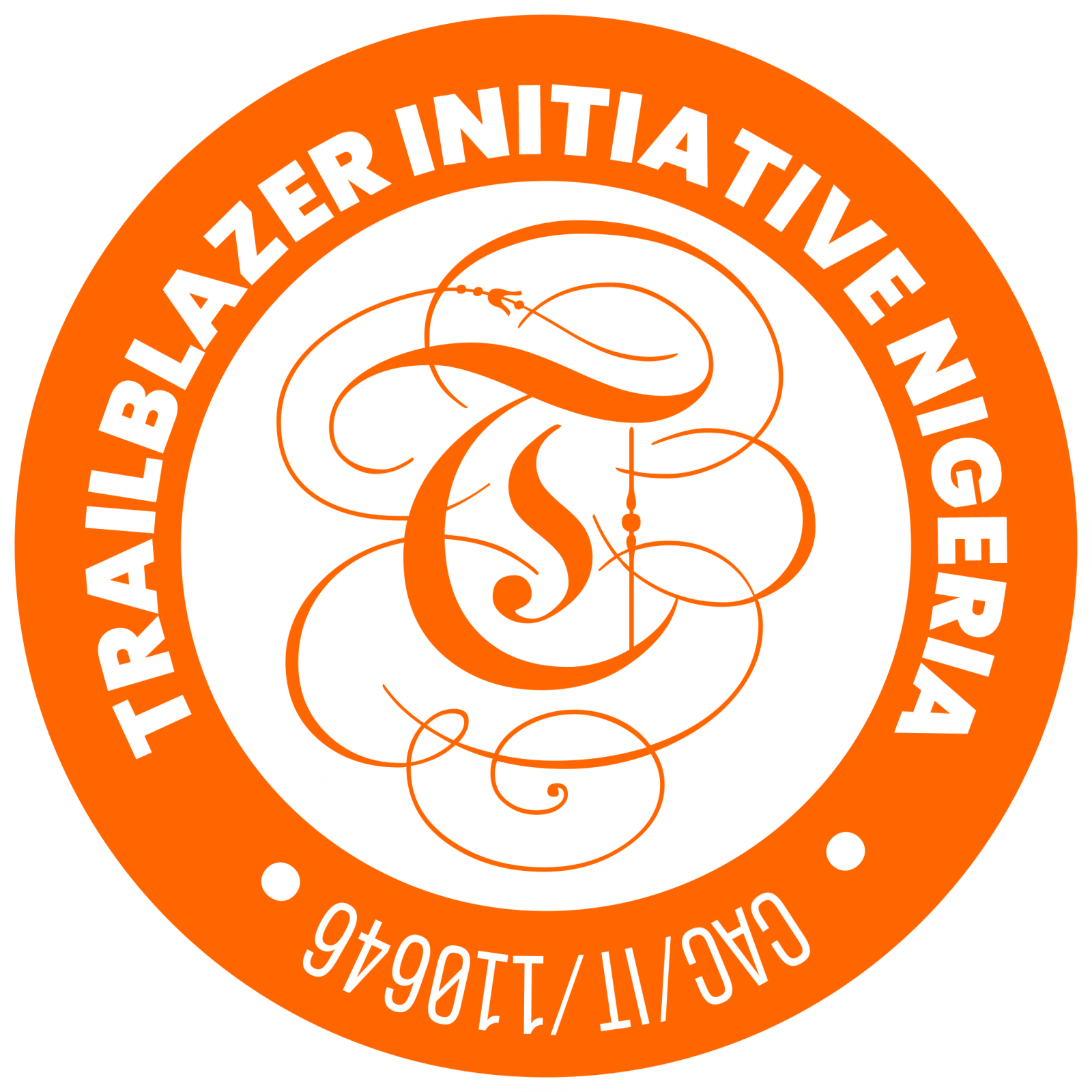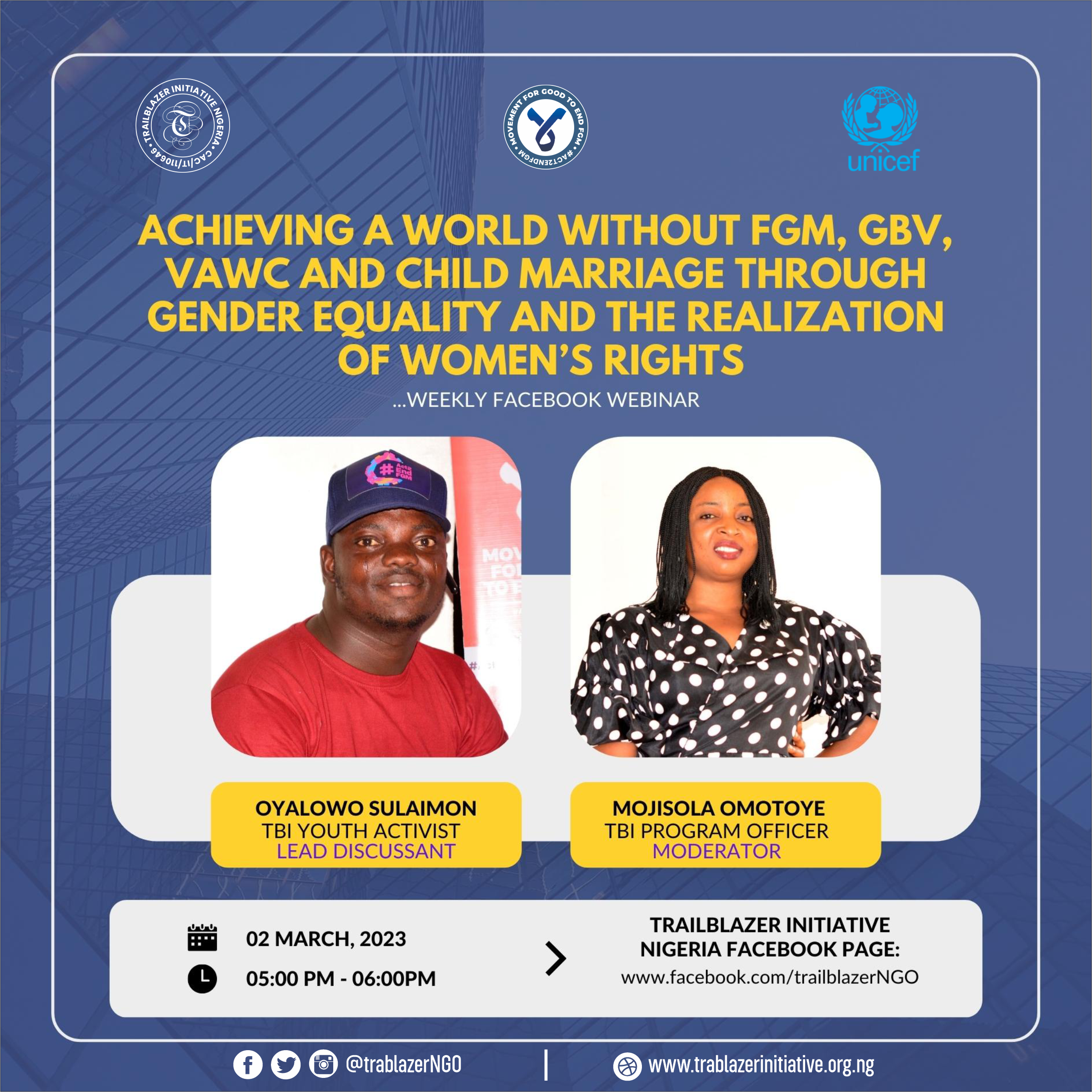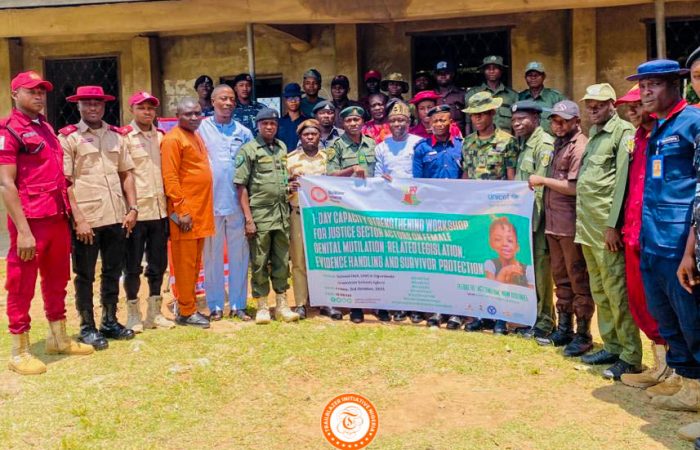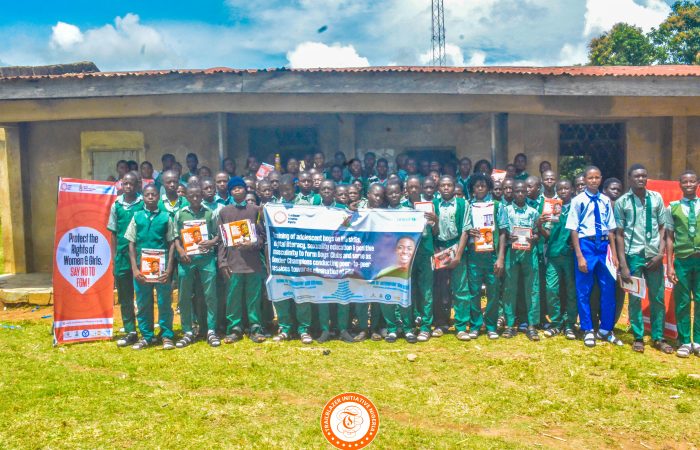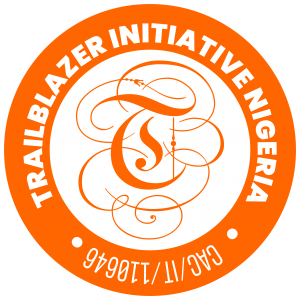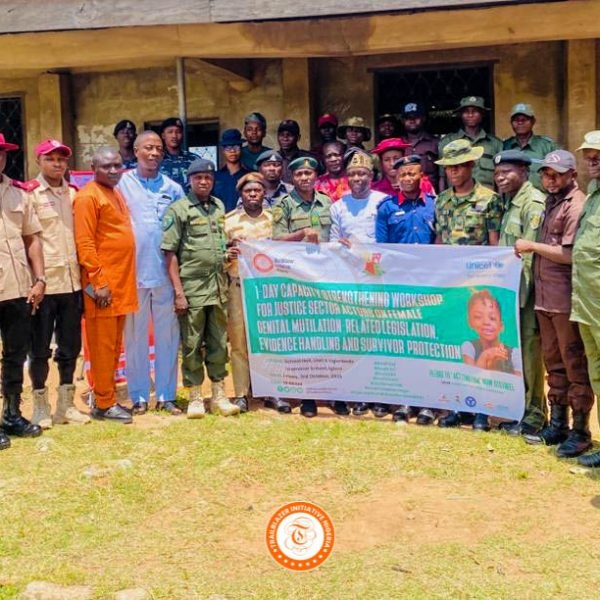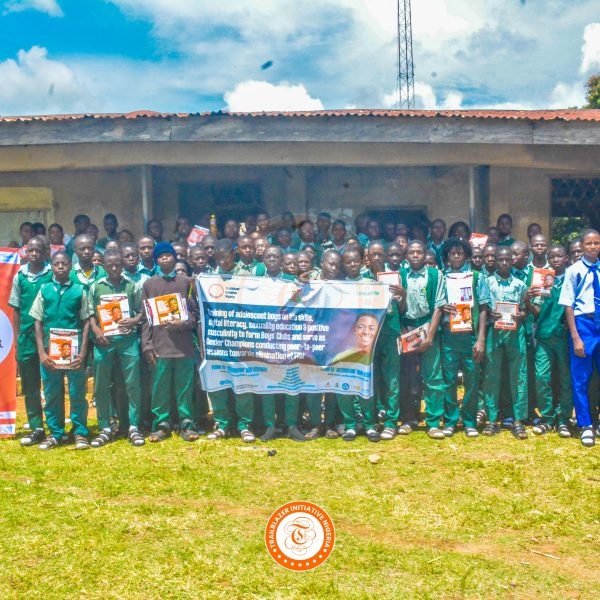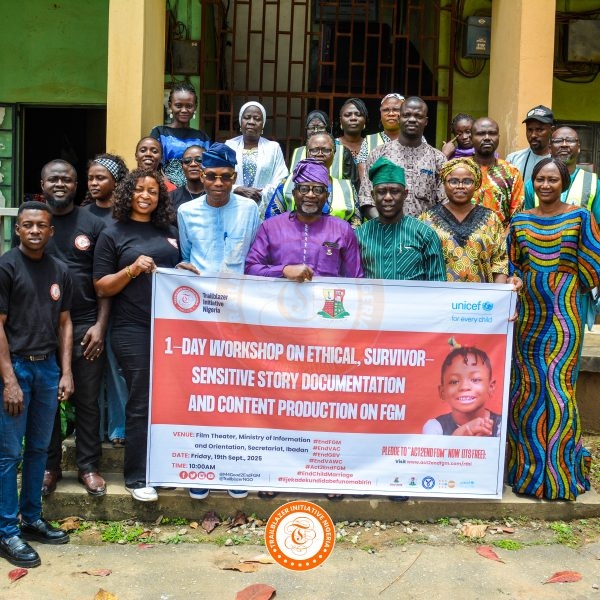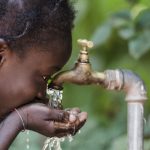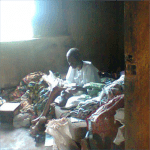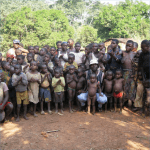By Sulaimon Oyalowo | Ibarapa North LGA Youth Activist
MOjisola Reads Sulaimon’s Profile: Sulaimon Oyalowo, is a Trailblazer Initiative Nigeria – UNICEF trained Youth Activist on elimination of FGM, GBV, Violence against Children and Child Marriage; he represents Ayete Community in Ibarapa North LGA of Oyo State. He is a member of WAI Brigade and the Chairman of National Youth Council of Nigeria, Ibarapa North LGA chapter. Sulaimon is a passionate about community development, Youth empowerment and protection of girl child’s right.
Learn more: https://trailblazerinitiative.org.ng/personnel/oyalowo-sulaimon-lekan/
MOJIOLA: Let’s dive into the conversation proper. For the purpose of people joining us for the first time, What does FGM stands for?
Mr Suluaimon Responds: Female Genital Mutilation (FGM) is an internationally recognized issue owing to its adverse impacts on physical and psychosocial wellbeing and erosion of sexual and reproductive health rights among women.
According to WHO, it is estimated that more than 200 million girls and women alive today have undergone female genital mutilation in the countries where the practice is concentrated and are living with the negative consequences of the practice.
It is also estimated that 3 million girls are at the risk of undergoing female genital mutilation every year.
Mojisola: So, what is Female Genital Mutilation (FGM)!?
Mr Sulaimon Responds: Female Genital Mutilation (FGM) comprises all procedures that involve the partial or total removal of external genitalia or other injury to the female genital organs for non-medical reasons.
FGM is also widely called various local and traditional names according to the community where it is practiced. FGM is a form of violence which is based on cultural beliefs and gender norms. This harmful practice is performed on babies, girls and women depending on the community.
In most communities, FGM is seen as a protection of virginity, a beautification process, and in a number of cultures is regarded as an essential precondition of marriage. There are different forms of FGM, some of which involve more radical excisions in the genital area than others.
The World Health Organization (WHO) has classified FGM into four types, and they are all practiced in Nigeria.
FGM Type 1 is defined as the partial or total removal of the clitoris and/or the prepuce (Clitoridectomy). The subgroups of Type 1 FGM are: type 1a, removal of the clitoral hood or prepuce only; type 1b, removal of the clitoris with the prepuce.
FGM Type 2 entails the partial or total removal of the clitoris and the labia minora, with or without excision of the labia majora (excision). Subgroups of Type II FGM are: type 2a, removal of the labia minora only; type 2b, partial or total removal of the clitoris and labia minora; type 2c, partial or total removal of the clitoris, labia minora and labia majora.
FGM Type 3 involves the narrowing of the vaginal orifice with creation of a covering seal by cutting and appositioning the labia minora and/or the labia majora, with or without excision of the clitoris (infibulation). Subgroups of Type III FGM are: type IIIa, removal and apposition of the labia minora; type IIIb, removal and apposition of the labia majora.
FGM Type 4 is also known as unclassified and involves all other harmful procedures to the female genitalia for nonmedical purposes, for example, pricking, piercing, incising, scraping and cauterization.
The FGM Type 4 also includes the practice of “massaging” or applying petroleum jelly, herbal concoctions or hot water to the clitoris to desensitize it or pushing it back into the body, which is common in many parts of Africa including Nigeria.
Mojisola: Does FGM has any benefit or Consequence?
Mr Sulaimon Responds: FGM has so many consequences including short and long terms consequences ranging from excessive bleeding, trauma, Contraction of infections, etc.
Although the elimination of FGM was originally regarded as a mere question of health education and information, today FGM is recognized as a socio-cultural problem that is deeply rooted within the societies in which it is practiced.
Thus social change is indispensable if the practice is to be ended permanently. Commitment to ending FGM is symbolic of the effort to strengthen the position of women and women’s rights generally, because FGM is a serious violation of human rights.
Mojisola: Now that you have shield light on FGM, What can you say about Gender-based Violence (GBV)?
Mr Sulaimon Responds: Gender-based Violence (GBV) is an umbrella term for any harmful act that is perpetrated against a person’s will and that is based on socially ascribed (i.e. gender) differences between males and females.
It includes acts that inflict physical, sexual or mental harm or suffering, threats of such acts, coercion, and other deprivations of liberty. These acts can occur in public or in private.
Mojisola: So, what is gender-based violence?
Mr Sulaimon Responds: We define gender-based violence as: Any harm or suffering that is perpetrated against a woman or girl, man or boy and that has a negative impact on the physical, sexual or psychological health, development or identity of the person. The cause of the violence is founded in gender-based power inequalities and gender-based discrimination.
10 CAUSES OF GENDER INEQUALITY
- Uneven access to education
- Lack of employment equality
- Job segregation
- Lack of legal protections
- Lack of bodily autonomy
- Poor medical care
- Lack of religious freedom
- Lack of political representation
- Racism
- Societal mindsets
Mojisola: Thank you so much for this wonder session. Let’s talk about Violence against Children…
Mr Sulaimon Responds: Violence against Children is all forms of physical or mental violence, injury and abuse, neglect or children negligent treatment, maltreatment or exploitation, including sexual abuse. – United Nations Convention on the Rights of the Child, 1989.
According to World Health Organization, Violence is an intentional use of force or power, threatened or actual, against one self, another person, or against a group or community that either results in or has a high likelihood of resulting in injury, death, psychological harm, mal-development, or deprivation.
A child is “All human beings below the age of 18 years unless under the law applicable to the child, majority is attained earlier” – United Nations Convention on the Rights of the Child, 1989).
Mojisola: How many Types of Violence against Children exists?
Mr Sulaimon Responds: There are basically 6 major types of Violence against Children, namely;
– Bullying
– Child Maltreatment
– Youth Violence
– Intimate Partner Violence
– Emotional or Psychological Violence
– Sexual Violence
Mojisola: What are Women’s Rights?
Mr Sulaimon Responds: Women’s rights are the fundamental human rights that were enshrined by the in the Universal Declaration of Human Rights for every human being on the planet over 70 years ago. These rights include the right to live free from violence, slavery, and discrimination; to be educated; to own property; to vote; and to earn a fair and equal wage.
According to ourworldindata.org and the UN Department of Economic and Social Affairs, about 49.6 percent of word human population is female. So, it goes without saying women’s rights are human rights.
That is to say, women are entitled to all of these rights. Yet almost everywhere around the world, women and girls are still denied them, often simply because of their gender.
My medical friends tell me that if about 50 percent of the body does not function well, or is deprived of required nutrients, it can lead to paralysis.
Therefore, it is critical for us to actively promote women’s rights for the world to maximise its potential for development in all spheres. Beyond the traditional rights, Women’s rights include a woman’s right to decide if and when she has children, and to have high-quality health care that means she won’t die in pregnancy or during childbirth.
As we know female genital mutilation, Gender-based Violence, Violence against Children and Women and Child Marriage is a violation of women and girls’ rights, and must be eliminated.
Mojisola: On the international scene, what foundation has been laid for achieving gender equality and promotion of women’s rights?
Mr Sulaimon Responds: This is in form of the Convention on the Elimination of all Forms of Discrimination Against Women (CEDAW), an international bill of rights for women, requires governments to end gender discrimination and affirms women’s rights to health services, including family planning.
Another important tool is the Beijing Declaration and Platform for Action. This was a rallying cry to entrench gender equality and women’s rights in every aspect of life.
Female genital mutilation (FGM) is a harmful traditional practice that involves the cutting or removal of the external genitals. It is typically found in traditional group or community cultures with patriarchal social structures.
The reasons for the practice of FGM are complex and the origins are often lost in the mists of time. Many reasons have been adduced as the reason FGM started. Some say FGM is to ensure the “marriageability” of a woman, emphasizing the ideologies of “virginity, purity, and sexual restraint”. By reducing sexual pleasure, the procedure was erroneously used to protect young girls’ and women’s “sexual propriety” and “morality,” some scholars believe that in the highly structured social framework of the ancient Egyptian empires, FGM was implemented as a means of perpetuating inequality between the classes, with families cutting young girls and women, signifying their commitment to the wealthy, polygamous men of their society.
Others grounds the practice of FGM is in the idea of protecting the health of women and their foetus. In some cultures, FGM is believed to improve hygiene and increase a woman’s probability of conception with intercourse. In addition, physical contact between the “toxic” clitoris and a baby during childbirth is thought to be potentially fatal to the foetus.
Mojisola: What is the linkage between FGM and others and gender inequality?
Mr Sulaimon Responds: What is clear, however, is that FGM is a manifestation of deeply entrenched gender inequality.
Gender inequality transcends the common acts and denials we see and talk about. Inequality is more of a mental structure that has been embedded at an unconscious level in people.
It is this mental construct that drives the physical manifestations. It is this mental construct that makes some women to perpetuate the very practices and institutions that seek to bury women’s rights. It has become the ‘norm’ in many societies.
Therefore, to entrench gender equality and promote women’s rights, we have to go beyond dealing with individual practices, and begin to deal with the mental indoctrination at all levels.
From childhood through to the highest political, religious and socio-cultural institutions, gender inequality is at the root of most practices; from the traditional, such as widowhood rites, breast tying, denial of women inheritance, child marriage, female disenfranchisement, females needing escorts in public, females required to cover their faces or bow their heads when men are there, refusal to allow women decide on family planning options, etc.
On to the more modern manifestations such as shortage of women in leadership in Africa, disparity in girl child education, hiring and wage discrepancies, spousal violence and many more.
If we can get gender equality as the new normal, not just at a physical concept, but at a mental and social reality, then we would have very little to do to achieve our goal to #endFGM.
Mojisola: How then can this be achieved?
Mr Sulaimon Responds: We need to interrogate the reason for all that we do. Remember that it is a first and foremost an age-long indoctrination.
So, we must be counter-intuitive. We must question the reason for every decision that seems to set different standards or expectations for the sexes. It starts from chores on the home front, to social activities, on to economic, political, educational and legal opportunities.
Winning rights for women is about more than giving opportunities to any individual woman or girl; it is also about changing how countries and communities work. It involves changing laws and policies, winning hearts and minds, and investing in strong women’s organizations and movements.
Once gender equality is entrenched, once women’s rights are guaranteed and enforced, we would have eliminated female genital mutilation along with all other harmful traditional practices (e.g. child marriage) that negatively affect the health and social wellbeing of women and girls.
Mojisola: Thank you so much Mr Sulaimon Oyalowo for your awesome presentations. Its been wonderful time with you and eye-opening.
Mojisola reads out comments….
Mojisola: Thanks for being part of our conversations today. Join us every Thursday between 5 – 6pm. Visit our website www.act2endfgm.com/rtbi Pledge and #Act2endFGM, and kindly follow the handle “Trailblazer Initiative Nigeria’’ on all social media platforms.
As we celebrate the 2023 International Women’s Day (IWD) on 8th March 202, with the campaign theme “INTERNATIONAL WOMEN’S DAY DigitALL: Innovation and technology for gender equality. Please do join our planned activities both online and offline. You can check our website and all our social media platforms for update.
It’s time to hear and respond to your questions and/or opinions based on the conference. Keep them coming. Once again, Mojisola Omotoye
